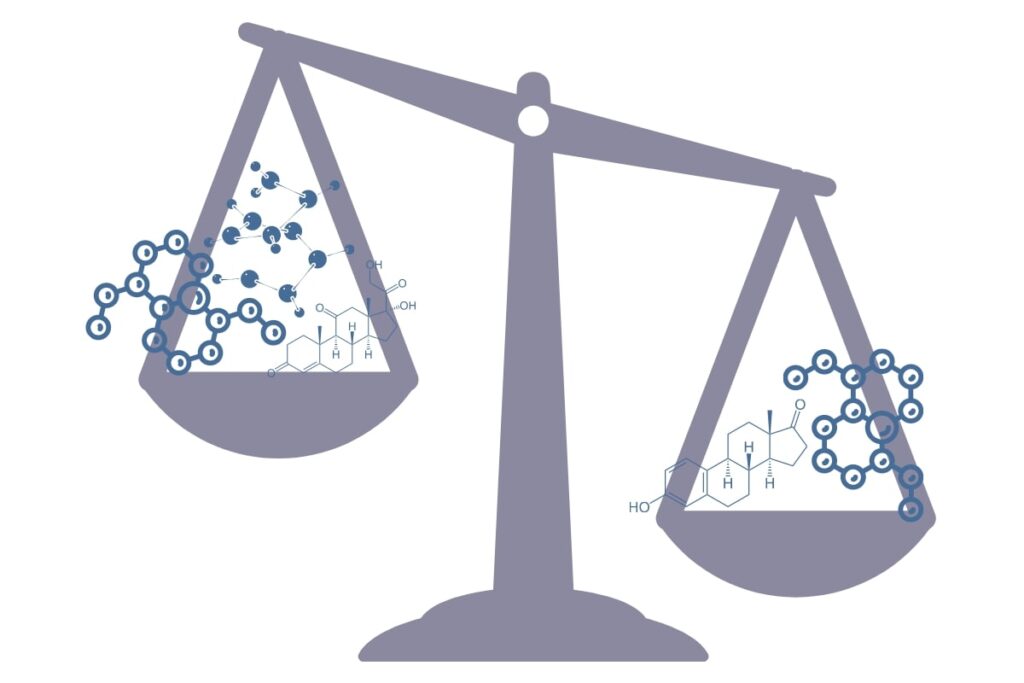Hormonal Health: Estrogen, Cortisol & more

Here’s how to optimize your hormonal health
Hormones are tiny chemical messengers present in everyone’s body – men and women. They are produced by glands in the endocrine system (pituitary, pineal, thyroid, parathyroid, adrenal, pancreas, and thymus — along with the ovaries in women and the testes in men) and sent to organs and tissues through the bloodstream. When hormones (and your endocrine system) are functioning normally, chances are you won’t notice their influence on your body. However, their impact is BIG.
Hormones are responsible for:
- Regulating metabolism
- Stabilizing mood
- Development and growth
- Sexual function
- Cognitive function
- Maintaining body temperature, etc.
It only takes a tiny amount of a hormone to make a major change in the body – so a slight excess or deficiency of any type of hormone can lead to disease. For example, too little of the hormone insulin inhibits the body’s ability to synthesize blood sugar from food, over time giving rise to diabetes and associated complications.

How to know if you have a hormonal imbalance
Symptoms of a hormonal imbalance vary, and in most cases a simple blood work test will confirm if you are suffering from a hormonal upset. However, if you unexpectedly experience any of the following symptoms, it may be time to talk to your doctor.
- Weight gain
- A hump of fat between the shoulders
- Unexplained, and sometimes sudden, weight loss
- Fatigue
- Muscle weakness
- Muscle aches, tenderness, and stiffness
- Pain, stiffness, or swelling in your joints
- Increased or decreased heart rate
- Indigestion
- Constipation and diarrhea
Symptoms specific to women:
- Heavy, irregular, or painful periods
- Osteoporosis (weak, brittle bones)
- Hot flashes and night sweats
- Vaginal dryness
- Breast tenderness
- Acne during or just before menstruation
Symptoms specific to men:
- Reduced sex drive
- Erectile dysfunction (ED)
- Low sperm count
- Reduced muscle mass
- Reduced body hair growth
- Overdevelopment of breast tissue
- Breast tenderness
Undiagnosed thyroid disorders
According to the American Thyroid Association, an estimated 20 million Americans have some form of thyroid disease. Up to 60% are unaware of their condition. What’s more, women are 5-8x more likely than men to have thyroid problems. Undiagnosed thyroid disease can put people at risk for a range of health problems, including cardiovascular diseases, osteoporosis and infertility.
The thyroid is a hormone producing gland that sits at the center of the lower neck, and it is critical for regulating the body’s metabolism, i.e. the rate at which the body processes food and oxygen into energy. For this reason, the thyroid impact every cell in the body, and too much thyroid hormone (hyperthyroidism) or too little (hypothyroidism) can have devastating effects on your well-being.

Dr. Subhashini Katumuluwa, a medical doctor with Ciba Health, explains why she sees so many people with undiagnosed thyroid issues: “Patients will come to me and say, ‘I have all these typical symptoms of hypothyroidism like a lot of fatigue, gaining weight for no reason, and I’m always cold. My provider tested my TSH (thyroid stimulating hormone) level, and it came back normal, so they said I don’t have an issue.’ So I really tend to go by how the patient is feeling, so if they’re telling me they don’t feel well, then I will definitely keep digging deeper.”
Diagnosing hormonal imbalances
A conventional medical approach to diagnosing a hormonal imbalance is very much symptom-oriented. If your doctor suspects your symptoms line up with that of a hormone imbalance, a set of lab tests will likely be run to “rule out” any catastrophic diagnoses. Then, medication (often a synthetic hormone) will be prescribed to address the hormone disruption.
For example, let’s imagine a 45 y/o woman comes into her doctor’s office with symptoms of fatigue, irregular bleeding, and weight gain. The conventional approach would be to check a basic thyroid panel, a complete blood count, and possibly prolactin levels to rule out any brain tumors. She will then probably go through an invasive endometrial biopsy and even an MRI, as well as ultrasounds. These methods often produce “normal” results – despite the woman’s clear and grievous symptoms. She will likely be prescribed a synthetic hormone to control the bleeding, and told she needs to lose weight (without instruction on how to do so).
Patients and doctors who have had similar, frustrating experiences with traditional medical approaches that focus too heavily on alleviating symptoms may want to try a functional medical approach, which aims to heal the root cause of disease and illness.
Dr. Katumuluwa continues, “TSH, as a reminder, is not actually a thyroid hormone. It’s a brain hormone. TSH is a hormone that your brain produces to tell your thyroid gland whether to produce more or less thyroid hormone. So, it’s possible for that TSH level to be in what’s called the ‘reference range’ for the lab value, but for that person’s actual thyroid hormone levels to not be optimal.”
There’s a big difference between reference range (what’s considered normal) and the optimal range for that specific hormone. Reference ranges differ for each laboratory, because they depend on the specific test population used by that laboratory. All that a reference range is telling us is where 95% of the people that were in the test population fell. As long as your levels are within that so-called “reference range,” it doesn’t raise any red flags. But this does not mean your level are optimal. Instead of relying on reference ranges, functional medicine practitioners look at optimal level for every hormone to see if there is a deficiency or over-production.

Ways to start fueling hormonal health today
Here are some suggestions for how to balance your hormones naturally while you work with your doctor. These diet and lifestyle changes are meant to compliment (not replace) the advice of your practitioner.
Strive to eat a balanced diet, consisting mainly of fresh fruits, fresh vegetables, whole grains, legumes, nuts, and lean proteins. Eating a balanced diet can encourage weight loss, which can improve hormonal functioning.
Avoid foods that provide calories but few nutrients, a.k.a. “empty calorie” foods such as cakes, cookies, donuts, processed meats, energy drinks, sodas, fruit drinks with added sugar, ice cream, chips and fries.
Do not exceed the recommended alcohol intake, which is no more than 1 drink per day for women and no more than 2 drinks per day for men (1 drink is equivalent to 12 oz. of beer, 5 oz. of wine, or 1.5 oz. of distilled spirits).
Incorporate more exercise into your daily routine by taking 30 minute walks or bike rides, signing up for a group fitness class, or practicing yoga, which can increase strength, flexibility, and mindfulness.

